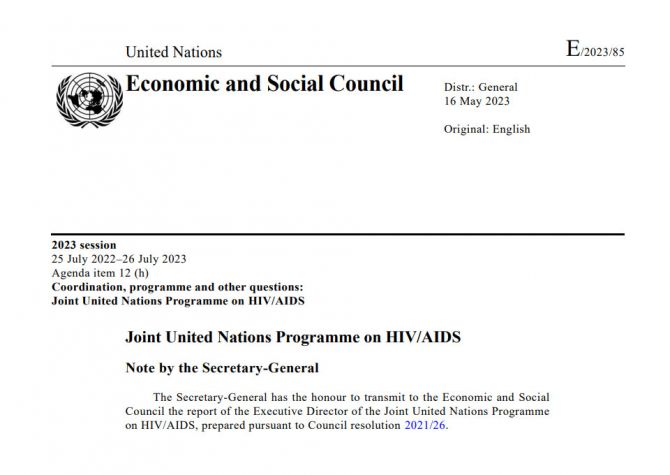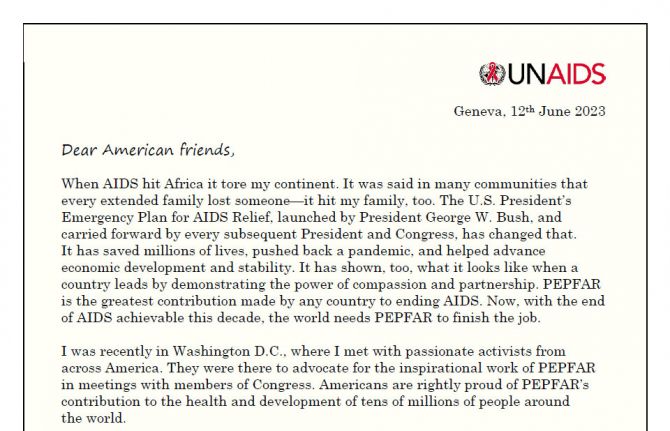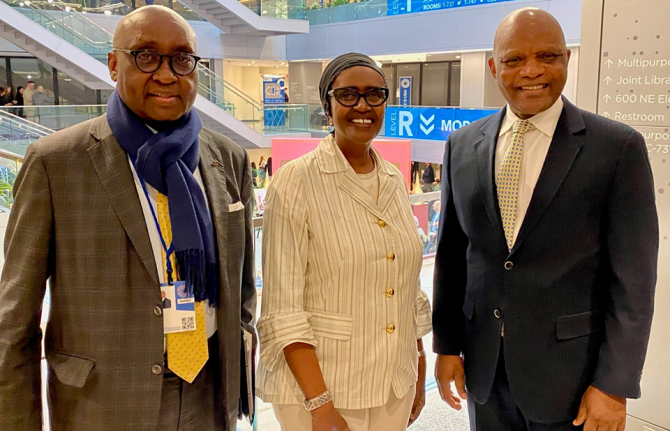
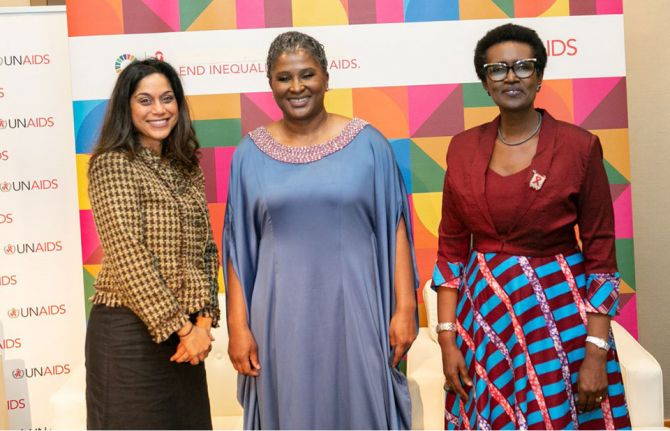

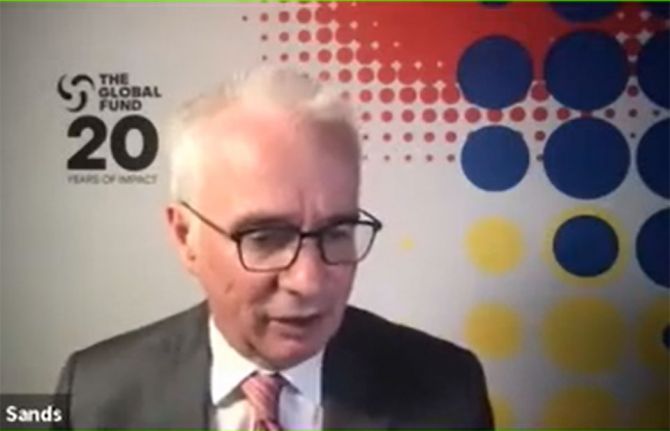


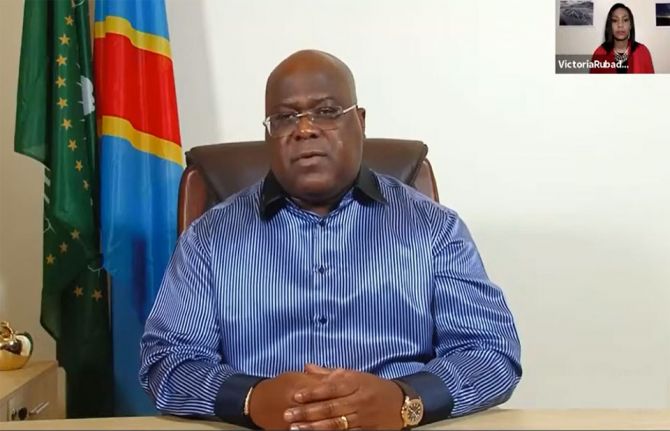
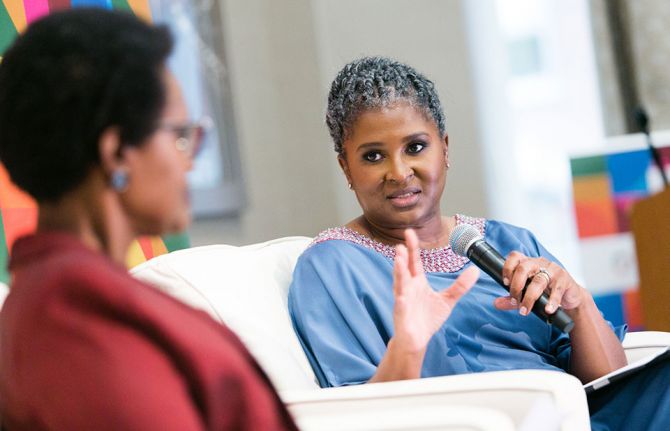
Feature Story
Partnering to get back on track to end AIDS by 2030
24 September 2021
24 September 2021 24 September 2021UNAIDS, the United States President’s Emergency Plan for AIDS Relief (PEPFAR) and the Global Fund to Fight AIDS, Tuberculosis and Malaria (Global Fund) came together this week to co-host an event on the powerful partnership between the three organizations, countries and communities. The event, held on the sidelines of the 76th session of the United Nations General Assembly, highlighted the millions of lives saved through the partnership but warned that COVID-19 has hit hard and risks derailing efforts to end AIDS by 2030.
“We are in one of the most challenging moments in the history of HIV and global health,” said Winnie Byanyima, the Executive Director of UNAIDS. “We must act urgently. Our partnerships are strong and flexible and we must use what we have learned together to prevent a resurgent AIDS pandemic, to end inequalities and to tackle COVID-19.”
COVID-19 has had a hugely damaging impact on HIV services over the past 18 months. Peter Sands, the Executive Director of the Global Fund, said that the number of mothers receiving prevention of mother-to-child transmission of HIV services dropped by 4.5%, the number of people reached with HIV prevention programmes declined by 11%, HIV testing declined by 22% and voluntary medical male circumcision for HIV prevention dropped by 27%. “We were off track against our targets before COVID-19 hit and COVID-19 has knocked us further off track,” he said. “It’s going to be incredibly difficult to get fully back on track on HIV until we have got on top of COVID-19.”
Widening inequalities due to COVID-19 were highlighted by the First Lady of Namibia, Monica Geingos, who joined Ms Byanyima in a live discussion from New York, United States of America. “After lockdown we are seeing a doubling of adolescent pregnancy rates, and we are assuming that new HIV infections among 15–24-year-olds will also increase,” she said. “When you remove children from a school environment, when you remove sex education you compromise education outcomes.” UNAIDS data show that if girls complete secondary education, it can reduce their risk of HIV infection by up to half in some countries.
Felix-Antoine Tshisekedi Tshilombo, the President of the Democratic Republic of the Congo and Chair of the African Union, joined the event with a powerful video message, saying, “We have been fighting HIV for 40 years and our successes and failures have taught us that we cannot conquer a pandemic without ending inequalities, promoting people-centred approaches while respecting human rights.”
The need for strong and continued partnerships to tackle both HIV and COVID-19 was strongly emphasized. Angeli Achrekar, the Acting United States Global AIDS Coordinator, who joined the event live in New York, said, “Nothing is possible without partnership. The partnership we have with PEPFAR, the Global Fund and UNAIDS is absolutely essential because we work hand in hand with countries and communities, the private sector and multilateral organizations to make things happen.”
The speakers urged bold political leadership, global solidarity and strategic partnerships that engage the people most affected by HIV. “What we need from governments is that they know that without us they cannot reach communities and achieve the ambitious goals,” said Sbongile Nkosi, the Co-Executive Director of the Global Network of People Living with HIV, who joined live from South Africa. “Governments must understand that we are the best allies in the response. We know the struggle, we know the solutions and we are committed to ending AIDS.”
The event was held at a landmark moment, 40 years since the first AIDS cases were reported and at the 25th anniversary of UNAIDS and the 20th anniversary of the Global Fund. “Forty years ago, a new virus emerged and sparked the HIV/AIDS pandemic,” said Tedros Adhanom Ghebreyesus, the Director-General of the World Health Organization. “Life-saving medicines were developed but the world’s poorest had no access to them and addressing this dire crisis of inequity took more than a decade. The multisectoral efforts often led by communities of people living with or affected by HIV were supported by unprecedented levels of international assistance from UNAIDS, the Global Fund and PEPFAR. Since then, millions of lives have been saved.”
There have been major successes in stopping new HIV infections among children and reducing AIDS-related deaths, but despite a 59% decline in AIDS-related deaths among children between 2010 and 2020, Omar Abdi, the Deputy Executive Director of the United Nations Children’s Fund, stressed that much more needs to be done. Just 54% of children living with HIV were accessing HIV treatment in 2020, compared to 74% of adults. “Ending AIDS in children needs our collective action to link the 1.7 million children living with HIV globally to HIV treatment to keep them healthy and alive. That’s why we are proposing a global framework to drive commitment and catalyse global action to end paediatric AIDS,” he said.
Usha Rao-Monari, the Associate Administrator of the United Nations Development Programme, highlighted the inequalities preventing key populations from accessing HIV services. She said that HIV services for key populations are “uneven or entirely absent” and underscored that key populations and their sexual partners account for 65% of new HIV infections worldwide, and for 93% of infections outside of sub-Saharan Africa. “Our work is absolutely not done,” she said. “Gender and other intersecting inequalities as well as punitive and discriminatory laws make people more vulnerable to HIV and hinder access to services. We need to address the inequalities that for decades have fuelled the spread of HIV.”
The hybrid event was a mixture of in-person discussions from the live venue in New York, video messages and live video link-ups from around the world. It was moderated from Nairobi, Kenya, by award-winning journalist Victoria Rubadiri, with live moderation of in-person discussions in New York by Regan Hofmann, Director, a.i., of the UNAIDS Liaison Office in Washington, DC, United States.

